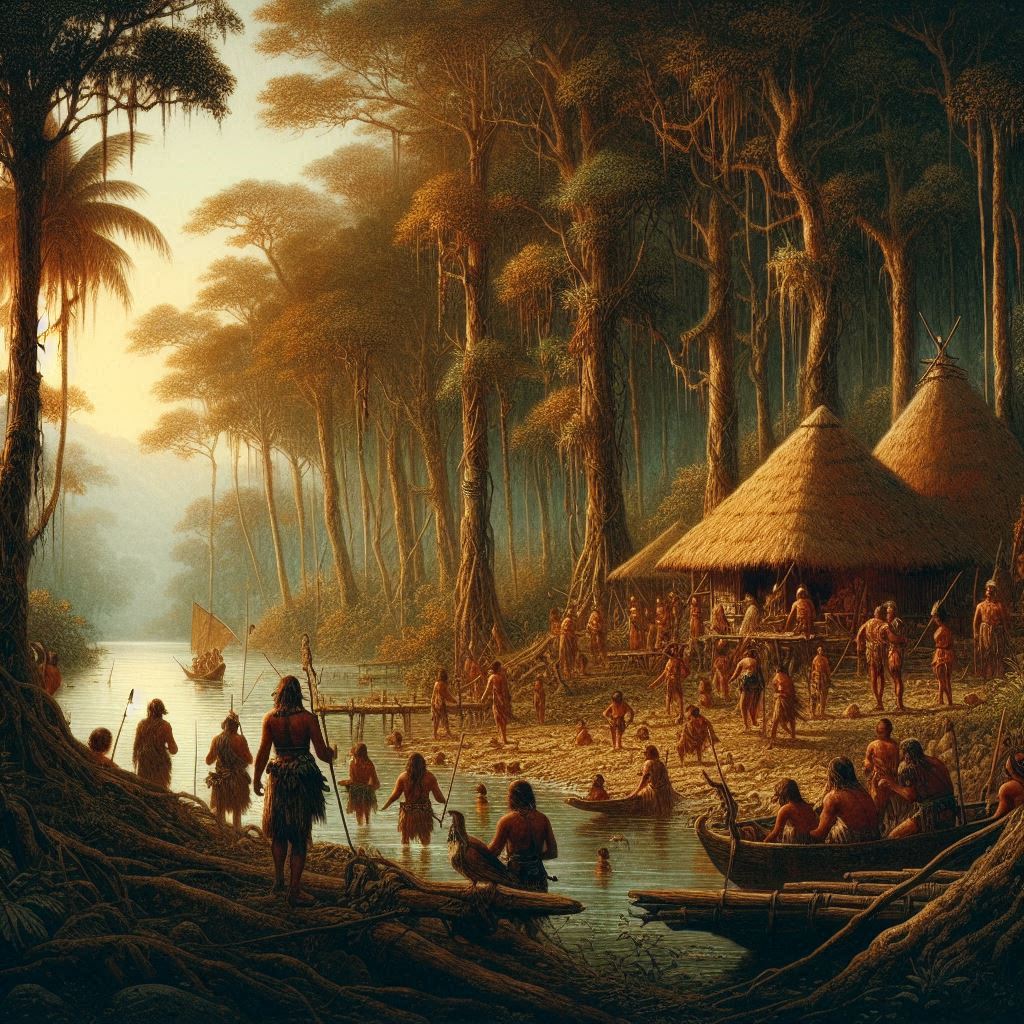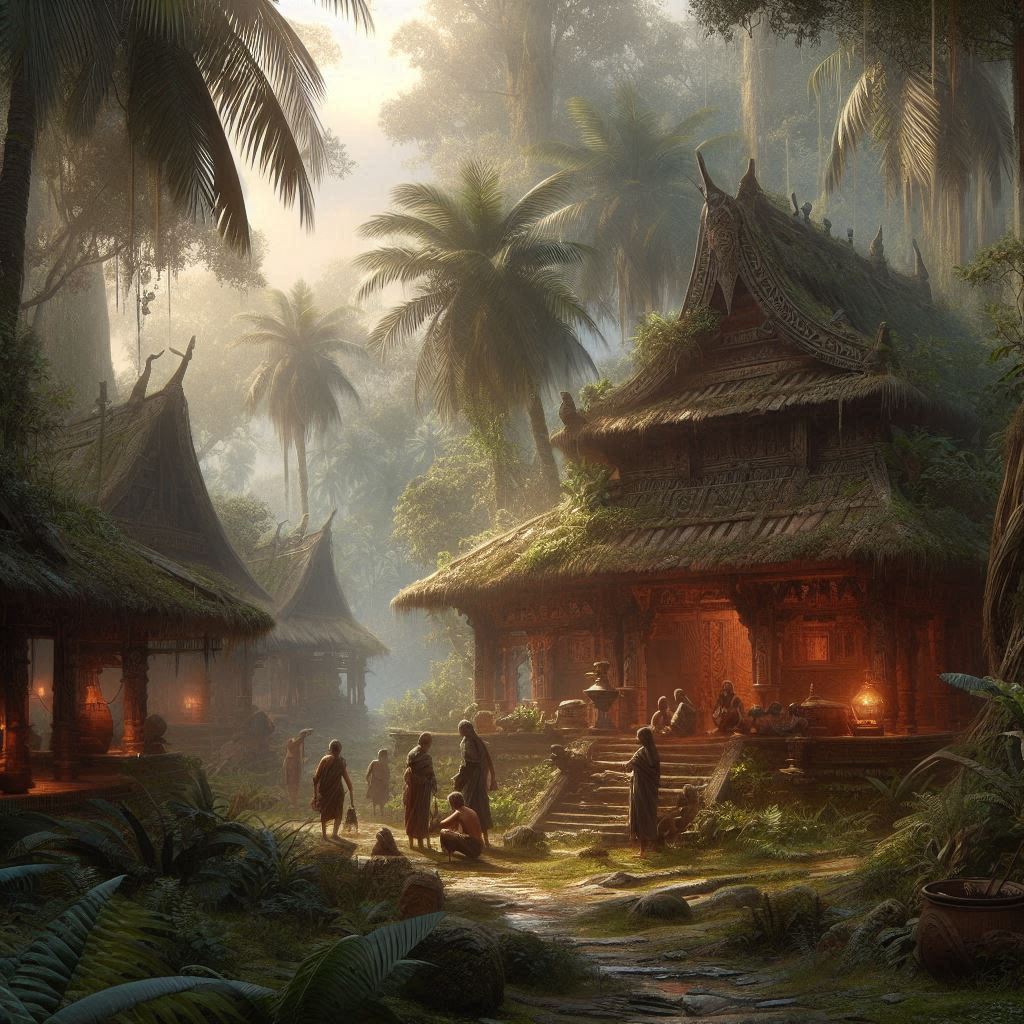Jungle culture
CULTURES SKILLS
- Ambush
- Camouflage
- Climbing
- Direction Sense
- Disguise
- Foraging
- Hide Item
- Poison Lore
- Rope Mastery
- Rowing
- Set Traps
- Stalk & Hide
- Stilt Walking
- Tightrope Walking
- Trap Building
- Wood-Crafts
- Woodworking
- Fletching
- Hunting
- Read Tracks
- Tracking
Legend
“From within the deep, dense green jungle have emerged some of the most outstanding heroes and herbs.”
Description

Jungle dwellers, often called ‘moss men,’ as they remind of Moss'Ari, are known for their adaptability, resourcefulness, and profound connection to the jungle. They possess extensive knowledge of the jungle’s flora and fauna, and their lives are intricately interwoven with the natural world. Many are hunters, gatherers, or traders, exchanging the jungle’s rich resources with the outside world.
Lifestyle: Jungle dwellers live in extended families within fortified clanholds. They are expert hunters, gatherers, and traders. As skilled oral storytellers, they are gifted poets, musicians, and singers. Pugnacious by nature, disputes are often settled through raiding or warfare. Their unique hunting and gathering techniques, along with skills in camouflage and stealth, are essential for survival.
Diet: Jungle cultures have access to a wide variety of fruits, nuts, and wild game. Their diet often includes fruits, edible insects, and plants like cassava and plantains. They may also fish in rivers and practice small-scale agriculture. The jungle provides a rich, diverse diet, but it requires extensive knowledge of what is safe to eat.
Traditions and Stories: Jungle dwellers have a rich oral tradition that includes myths, legends, and tales of ancient heroes and powerful jungle spirits. Stories are passed down through generations, preserving history, teaching lessons, and providing entertainment. Ritualistic dances, songs, and ceremonies often accompany these stories, celebrating their heritage and reinforcing community bonds.
Marriage Pattern: Monogamous marriages are common, but individuals must marry outside their family. Political marriages also occur, strengthening alliances between clans.
Religion: Their religion includes superstitious rituals devoted to the “True Gods.” Oral traditions are crucial for preserving histories and laws. Sacrifices are common, and the clergy, often shamans, are both revered and feared. Animism and spirit worship are integral to their belief system.
- Religious system: Nature worship through a connection to the natural world, with deities representing elements or animals.
- God-Mortal Interaction: Shamans are crucial for communication with the spirit world and healing.
- Rituals: Ceremonies to appease jungle spirits, harvest festivals, and rites of passage involving physical trials.
- Impact on Society: A strong connection to nature often leads to a reverence for life and a sustainable lifestyle. Shamans hold significant influence in decision-making.
Skjald Sejrik
Craftsmanship: Jungle dwellers are known for their intricate wood carvings, weaving, pottery, and potion-making. Their crafts depict scenes from daily life, myths, and nature, reflecting their deep cultural identity. While rustic, their work is highly valued for its beauty and significance.
Clothing & Decoration: They wear clothing made from crude fibres, leaves, wool, hides, and furs. Their attire often includes symbols and decorations indicating clan affiliation. Jewellery and body paint made from natural materials are common, especially during ceremonies and festivals.
Armour: Most jungle dwellers wear no armour or soft leather armour, favouring agility and stealth. Some elite warriors fight naked, relying on their skill and speed.
Weapons: Their arsenal includes blowpipes, bows, darts, clubs, daggers, handaxes, javelins, spears, and slings. These weapons are crafted from readily available materials, emphasising functionality and ease of use.
Special Items: Their workmanship, while crude, has aesthetic appeal to those with rustic tastes. Items are typically made from materials that do not long endure, such as bronze, copper, tin, leather, yarn, and wood.
Skjald El Mary
Time: Jungle cultures conform to natural cycles defined by plant growth cycles, animal migrations, weather patterns, rain, monsoons, and celestial events.
Accomplishment and achievement: Survival of a collective community in dense jungles. Herbal knowledge, resource sharing, harmony with the dense environment, and the protection of sacred sites are essential.
Authority Interaction: Respect for shamans and those with extensive jungle knowledge. Shamanic chiefs, spiritual figures, or tribal councils exercise authority while respecting natural spirits.
Fears & Inabilities: Numerous superstitions influence their behaviour, notably a deep fear of spirits and the supernatural.
Mien: Culture has a medium influence on demeanor, so individual personality is still evident.
Mannerism: Dense environment might foster a cautious, observant demeanor, yet vocal and animated. Enjoy storytelling and conversation.
Prejudices: They generally harbour animosity towards Swampers and often despise Nomads, stemming from historical conflicts and cultural differences.
Skjald Kazumix
Resistance: Jungle dwellers have developed significant resilience to their environment.
Disease Resistance: Moderate, as living in the jungle exposes them to tropical diseases, but their adaptability aids in building resilience.
Poison Resistance: Moderate to High. Their profound knowledge of flora and fauna enhances their resistance to local toxins.
Remedies: They use a wide array of herbs, animal parts, and natural elements to create remedies. Their knowledge of medicinal plants and poisons is highly advanced, allowing them to treat various ailments effectively.
Skjald Ulrich
History

Jungle cultures have a long history of isolation, resulting in unique languages and customs. Their tales often feature ancient, powerful jungle spirits, legendary shamans, and heroic ancestors who protected their people and the jungle..
Skjald Sigurd
Cartography

Their settlements are typically hidden within the dense jungle, designed to blend seamlessly with the natural surroundings. Fortified clanholds serve as both living spaces and defensive structures. These settlements are often built on elevated platforms to protect against floods and predators.
Skjald Vinotis
Organisation

Tribal structures are common, with leadership based on wisdom, spiritual authority, or hunting prowess. Complex social systems involving age, gender, and kinship determine roles and responsibilities within the community.
Skjald Yell'a'Beard
Special

Jungle cultures possess advanced knowledge of medicinal plants and poisons, allowing them to thrive in their environment. They are adept at utilising the jungle’s resources for food, medicine, and trade. Their deep connection to nature and the spirits of the jungle is central to their identity and survival.
Skjald Kazumix
Last Updated on 2024-10-20 by IoM-Christian
